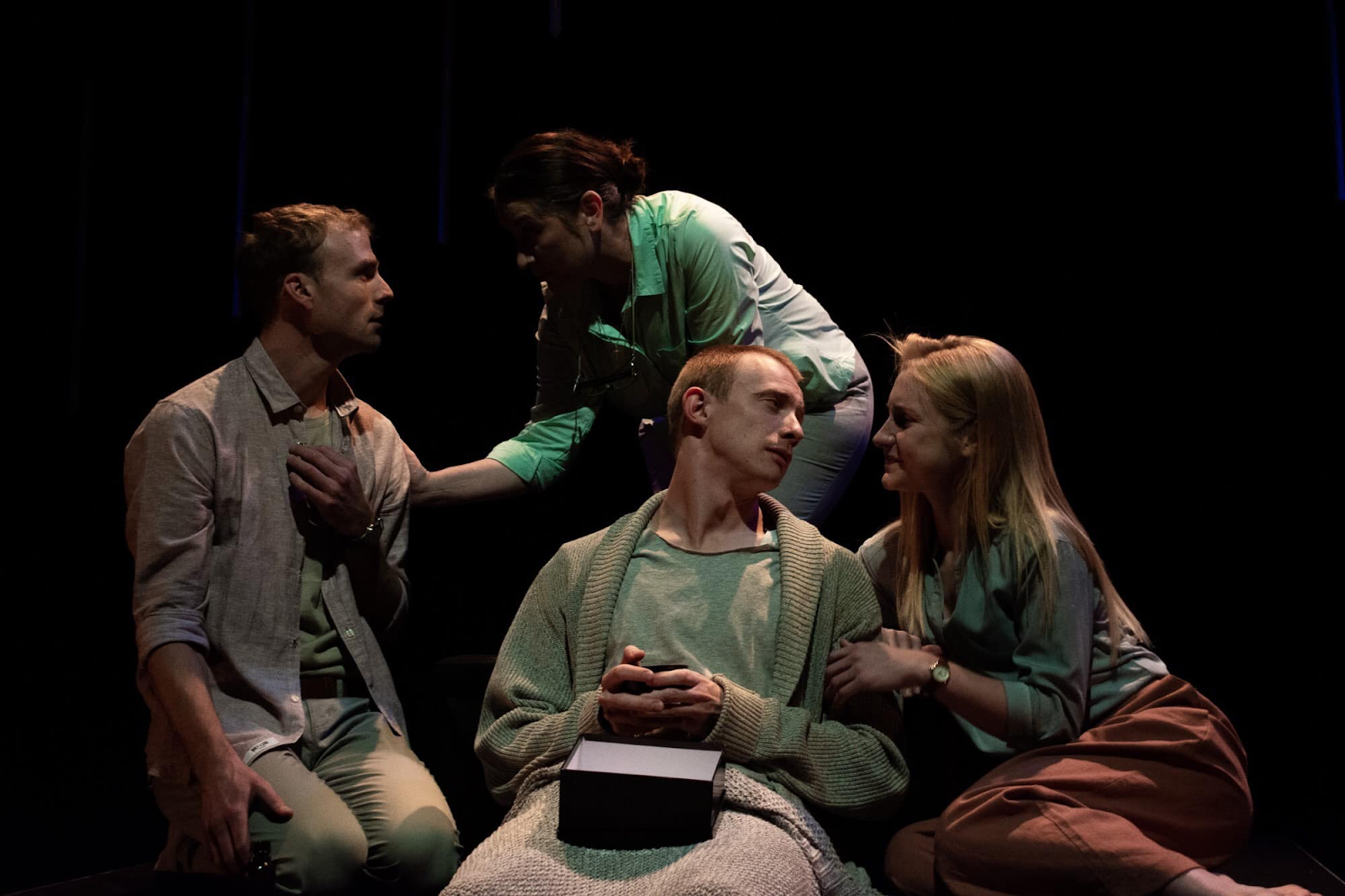By Catherine Smith
FaceBook event : Link
To confront or not to confront – that is the question. Theatre-makers have long since pondered whether it’s enough to simply entertain, or whether the role of theatre is to challenge; to evoke feeling and start conversations. There is no escape from live theatre. Audiences are hauled into the fire alongside the performers, and nobody will leave, When the Light Leaves, unscathed.
Rory Godbold’s play centers around terminally ill Dan, played with anchoring gravity by Tomas Parrish. The 34-year old is coming to terms with a late diagnosis of stage four brain cancer. The prognosis inundates the youthful production with the turmoil of life in extremis. Tragedy begins to unfold as we watch the character dying in the middle of living. He has just met his partner Liam and all hopes and dreams are brought plummeting down.
As we watch Dan come to terms with the knowledge that he won’t make 35, we see his hopes and dreams compress. Plans for a European vacation with his partner become a fantasy, and he is left with only the desire for the breath in his body and the light in his eyes to leave at the same time. Parrish’s physical and emotional transformation leaves him unrecognizable by the end of the play, though hauntingly familiar for anybody who has seen death close up.
Parrish is supported by a superb ensemble. Veronica Thomas gives a poignant performance as Dan’s sister, Kate. Perhaps the worst off in the entire play, not only is she confronted by the mortality of her brother, but their mother is close to death and her relationship falls apart over the course of the story. Thomas is effortlessly intimate in a theatre full of people – her performance captivating. With a decade of experience behind her across film, television and the stage, don’t be deceived by her youth. Thomas was born to bear her soul under the unforgiving lights of the stage.
Just as comedy needs drama, so too does drama need comedy, and with a play like When the Light Leaves, the audience yearns for a moment to exhale. Thankfully, Godbold gives us Dan’s partner Liam who is masterfully portrayed by Leigh Scully. Liam repeatedly appears as a shining light, throwing a lifeline to the audience drowning in darkness. The life he breathes into Dan is echoed by the light he brings to the entire play. Scully’s ability to switch between humour and tragedy is commendable as he simultaneously gives the audience a chance to relax while twisting the knife in their chest just a little deeper. This is epitomised in his final speech following Dan’s death.
The glue of the piece is palliative care nurse, Alice, explored with depth and empathy by Michelle Robertson. In a role that could so easily be one dimensional – old-school-mean-nun vibe –, Robertson navigates the world of the character skillfully. Hours of research and exploration is evident in the way she avoids judging the character or worse, playing an idea . The role of palliative care nurses is pushed into the spotlight with Alice grappling between rules and regulations and her own compassion in knowing Dan at his most vulnerable.
The ensembles ability to delve into the depths of Godbold’s words is reflective of a professional cast who have attentively mastered their craft and their instruments.
The synergy between theatre-partners Jayde Kirchert (Director) and Stu Brown (Designer) is evident in a way not often seen in conventional theatre. Instead of the set design being an interesting backdrop to the piece, it’s amalgamated into the work: Household items hang down around the space; the apples Dan detested are the only thing he could stomach in his illness, the books that are read while dying, each item passing memories. The lights upstage illuminating the theatre like a chapel.h
Godbold’s writing is sophisticated and deals with tragedy in the most human way possible. He covers sensitive material with respect for its complexity and there is laughter in the most tragic moments as characters stumble through the unthinkable. With voluntary euthanasia beginning in Victoria during the run of the play, Godbold’s play is timely and relevant. It gives a human voice to an issue shrouded by legislation and politicians, and Godbold’s intimate relationship to death is evident in his writing.
When the Light Leaves is a harrowing theatrical experience that leaves the audience feeling as though they’ve been punched in the face – in the best way possible.The collaboration between High Line Productions and Citizen Theatre is on at La Mama Theatre and is running until the 23rd of June, before the ensemble embark on a regional tour.


